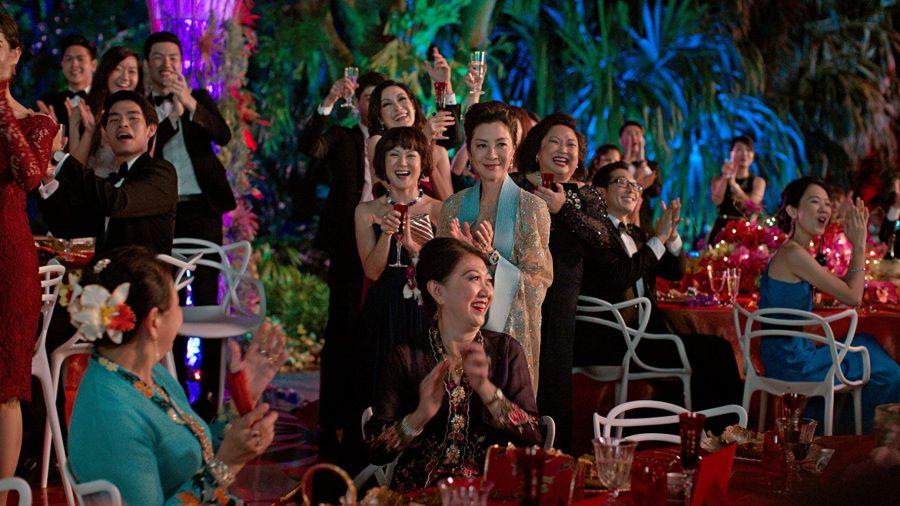“Crazy Rich Asians”: a dubious win for representation
An over-the-top wedding, family drama, riches and glamor all—not to mention an all-Asian, super attractive cast—what more could you want from Kevin Kwan’s romantic comedy, “Crazy Rich Asians”?
Despite all the hype generated around the movie, particularly about its groundbreaking representation of Asians, I was hesitant to watch it, as a Singaporean and as someone who had read the book prior to the movie.
The plot revolves around Chinese-American economics professor, Rachel Chu, and her Singaporean boyfriend Nick Young. Rachel is in for a surprise when Nick invites Rachel to attend his best friend’s wedding in Singapore, as she had not known how wealthy and famous Nick’s family is in Singapore. She struggles to navigate the confusing social landscape of the Chinese elite in Singapore, dealing with jealous socialites, quirky relatives and worse, Nick’s disapproving mother.
The movie is centered around the protagonist’s navigation between Asian American culture and Asian culture, and the setting of Singapore plays a huge role in this—but the Singapore in the movie is barely recognizable.
The most obvious aspect would be the inauthenticity of accents: Almost all the characters who are supposedly Singaporean speak in either American accents, or ultra-polished British accents. Only perhaps two characters have recognizable “Singlish” accents, and even so they take up less than five minutes of screen time.
Understandably, the producers do need to cater to a western audience who may find Singlish hard to understand, but this ignores the importance of Singlish to Singaporean identity. Singlish makes up not only the accent in which English is spoken, but also the myriad of Malay and Hokkien expressions mixed into it. It creates unique and quirky dynamics amongst its speakers and reveals Singapore’s distinctive brand of humor. For a romantic comedy, I did not find the comedy to embody any part of Singapore.
This is especially true for the character of Peik Lin. Peik Lin was one of my most anticipated characters to see on screen. I expected Peik Lin to speak in a Singlish accent, conveying best the hilarity and quirkiness of Singaporean humor, but also the down-to-earth, heartfelt warmth Singaporeans extend to their friends. While actress Awkwafina did a great job in making Peik Lin a lovable and hilarious character, her ultra-American mannerisms made me feel like Peik Lin’s Singaporean-ness was whitewashed.
Moreover, there is a lack of racial diversity in the Singapore portrayed on screen. Singapore prides itself on its racial and cultural diversity, yet Singapore’s ethnic minorities, Malays and Indians, are hardly represented. Even when they are, they are portrayed negatively as terrifying security guards or servants bustling in the background. Chinese in Singapore already enjoy “Chinese privilege,” the equivalent of white privilege in Singapore, being a majority whose interests dominate national affairs, so “Crazy Rich Asians” perpetuates Chinese dominance in Singapore in mainstream media.
Despite that, the intergenerational relationships between characters were genuine and touching. Rachel’s heart to heart moments with her mother tugged on my heartstrings. Nick’s respect and understanding of the sacrifice his mother made for him humanized his mother. The tension between Rachel and Eleanor, Nick’s mother, revealed the contrasting cultural mindsets of the westernized Asians and Asians in Asia, especially through a suspenseful mahjong scene. (Audiences would need a good knowledge of mahjong to understand the symbolism in the scene, though.) Rachel’s conflict with Eleanor and her past speaks to the displacement Asian-Americans feel when being othered in the country they grew up in for being Asian, but being rejected as ‘not Asian enough’ back in Asia.
“Crazy Rich Asians” can definitely still be meaningful for Asian Americans for its success at telling an Asian-American story and as a feel-good rom-com. But for it to be marketed as a win for representation is misleading; It shows instead that there is a divergence between the needs and priorities of Asian-Americans and Asians in Asia.


![[PHOTO COURTESY OF IMDB]](https://blueandgoldonline.org/wp-content/uploads/2025/03/IMG_3463-1200x724.jpeg)
![[PHOTO COURTESY OF IMDB]](https://blueandgoldonline.org/wp-content/uploads/2025/03/IMG_3465-1200x831.jpeg)
![[PHOTO COURTESY OF IMDB]](https://blueandgoldonline.org/wp-content/uploads/2025/03/IMG_3462-1200x707.jpeg)
![[PHOTO COURTESY OF IMDB]](https://blueandgoldonline.org/wp-content/uploads/2025/03/IMG_3461-1200x942.jpeg)
![[PHOTO COURTESY OF IMDB]](https://blueandgoldonline.org/wp-content/uploads/2025/01/IMG_2934-1200x511.jpeg)
![[PHOTO COURTESY OF WARNER BROS]](https://blueandgoldonline.org/wp-content/uploads/2025/01/IMG_2933.jpeg)
![[PHOTO COURTESY OF PENGUIN RANDOM HOUSE, PENGUIN BOOKS, PENGUIN BOOKSHOP]](https://blueandgoldonline.org/wp-content/uploads/2025/05/books-1200x675.png)
![A large "Coulda Been Love" sign in front of the show set. [PHOTO COURTESY OF DRUSKI'S COULDA BEEN LOVE SHOW]](https://blueandgoldonline.org/wp-content/uploads/2025/05/IMG_1877-1200x678.jpeg)
![[PHOTO COURTESY OF IMDB]](https://blueandgoldonline.org/wp-content/uploads/2025/05/Untitled-design-2.png)
![[PHOTO COURTESY OF IMDB]](https://blueandgoldonline.org/wp-content/uploads/2025/05/MV5BY2UwOGUxMzEtMzEyZi00NjEwLTkxOTMtYTljOWEzYjYyMWNjXkEyXkFqcGc@._V1_-810x1200.jpg)
![[PHOTO COURTESY OF SPOTIFY]](https://blueandgoldonline.org/wp-content/uploads/2025/03/IMG_3468-1200x594.jpeg)
![Tyler, The Creator, American rapper and record producer, reaches out his hand. [PHOTO COURTESY OF COLUMBIA RECORDS]](https://blueandgoldonline.org/wp-content/uploads/2025/01/IMG_2935.webp)